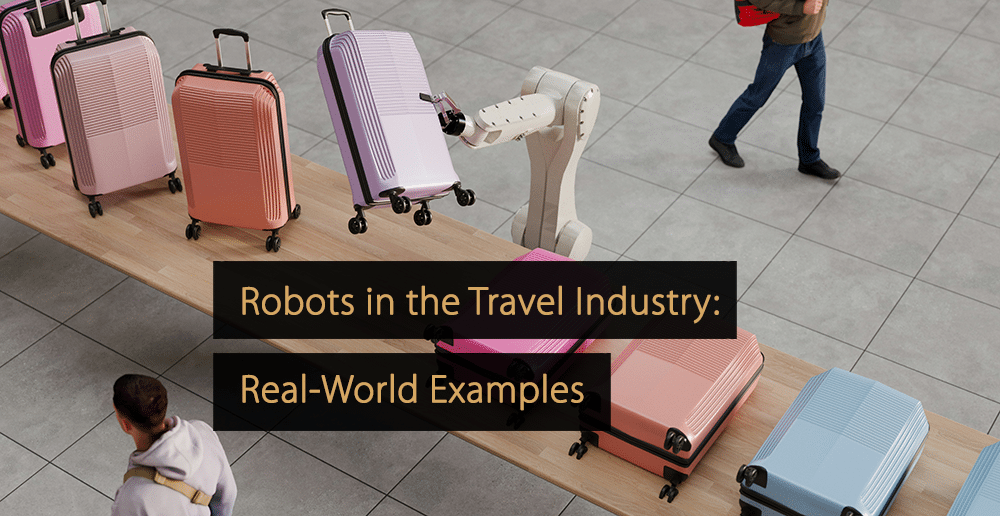Business travel is growing. As a result, hotels and others in the travel industry are looking to attract more business travelers, but to do so effectively, you need to know what those travelers are looking for. In this article, you will learn more about the latest trends influencing modern business travel decisions 2026.
Table of Contents:
- What is Business Travel?
- Business Travel is Growing
- 15 of the Latest Business Travel Trends in 2026
- 1. Bleisure Travel
- 2. Personalization
- 3. Sustainable Business Travel
- 4. The Internet of Things (IoT)
- 5. Sharing Economy
- 6. Customer Experience
- 7. Virtual Reality
- 8. Healthy Options
- 9. Workspaces With Fast and Reliable Internet
- 10. Self-Booking
- 11. Digital Breakthroughs
- 12. Modernized Business Travel Policies
- 13. Greater Use of Technology
- 14. Corporate Travel Management
- 15. Unconventional Accommodation
- List of Business Travel Agents to Attract More Business Travelers
- Tips to Attract More Business Travelers to Your Hotel
- More Tips Regarding Business Travel
What is Business Travel?
Business travel, otherwise known as corporate travel, is a term used to describe travel carried out on behalf of a business or to do business with someone else. The term applies regardless of how frequent the travel is, or how far away from the day-to-day work it takes the traveler (s).
Some common types of business travel include traveling to a different branch of the same company, traveling to a different location to meet suppliers or business partners, or traveling for a conference or business event. By most definitions, it involves traveling away from the workplace that requires at least one overnight stay.
Business Travel is Growing
This business travel market is receiving an increased focus from many in the travel industry, partly business travelers often spend more money on their travels, especially when their employer covers their costs. However, more importantly, business travel is growing, thanks to factors like globalization and the availability of flights.
Research compiled by Finances Online helps to highlight the extent of growth. For example, a study from the Global Business Travel Association shows that between 2016 and 2018, global business travel expenditures grew by more than five percent. Meanwhile, a Deloitte analysis estimates further growth in the upcoming years.
Business travel growth is especially appealing for hotels. After all, according to Certify, businesses spend 13 percent of their entire business travel budget on accommodation. Additionally, a further 21 percent is spent on meals, and hotels may be able to secure some of this through hotel restaurants and room service options.
The growth of business travel and the increase in business travelers require a response from the hotel industry. Hotels need to communicate with business travelers in different ways than with pure leisure travelers, appeal to them with different services, and carefully consider what they need, want, and expect.
15 of the Latest Business Travel Trends in 2026
For hotel owners and others in the travel industry interested in capitalizing on the growth of business travel, it is important to keep up with the latest developments. Below, you will learn about 15 of the latest business travel trends in 2026 and how they disrupt the industry.
1. Bleisure Travel
Bleisure travel refers to travel that combines both business and leisure elements. It is often primarily motivated by business, but the business traveler finds time on their trip to engage in leisure activities, or extends the duration of their business trip, to see the sights and participate in leisure activities.
Crucially, research shows that it is growing. Indeed, according to Expedia, more than 40 percent of trips are extended for leisure purposes, representing a key demographic for hotels to appeal to.
This significant business traveler demographic can potentially be convinced to extend their stay in your hotel with the right offering. Aside from granting easy access to nearby attractions, hotels need to think about the services and amenities they can provide so that business travelers have opportunities to enjoy themselves.
According to a study from SAP Concur, Millennials are the generation that takes the most bleisure trips, accounting for 38 percent of them in total. However, other generations are not far behind, with both Generation X and Baby Boomers accounting for 31 percent of bleisure trips each, highlighting its growing popularity across the board.
Video: Bleisure Travel
Find more detailed information about “Bleisure Travel” in the articles “What is Bleisure Travel?” and “Bleisure: Tips for Hotels to Attract More Bleisure Travelers”.
2. Personalization
The airline industry has been extremely effective at capitalizing on business travelers’ need for personalization, realizing that these travelers can become frequent, loyal, and high-value customers if they are treated as individuals. This desire for personalization has also extended to other areas of the travel industry, including hotels.
In truth, the personalization options hotels can offer are almost endless, especially given business travelers’ tendency to travel to the same places frequently. This allows hotels to use data from past trips to make recommendations, predictions, or adjustments, based on an individual’s habits, the services they have used, their payment methods, etc.
Video: Personalization for Business Travelers
Find more detailed information and examples about “Personalization marketing” in the travel industry in the article “5 Ways Personalization Marketing is Used in the Travel Industry”.
3. Sustainable Business Travel
Sustainable business travel is an approach to business travel that minimizes long-term damage and protects the environment. This has led to significant growth for sustainable accommodation and transportation providers. Businesses must behave more sustainably to protect the future of business travel and to meet the demands of customers. Business travelers and the travel industry alike are under pressure to demonstrate their ethics.
Examples of specific sustainability measures include eco-friendly hotels and restaurants that minimize energy usage, source ingredients locally. There is also a greater pressure on hotels and travel industry businesses to support their local communities and contribute to efforts to reduce the damage caused by tourism and business travel. Business travelers and their employers also face growing pressure to demonstrate efforts to behave more ethically and sustainably. A growing number of customers are willing to boycott businesses they feel are not making a sufficient effort to reduce their carbon footprint, so companies are often opting for trains instead of planes for domestic travel.
4. The Internet of Things (IoT)
Due to Internet connectivity, the Internet of Things refers to devices, appliances, and other ‘things’ that can send and receive data. IoT devices are becoming more common in households, with examples including smart energy meters, smart televisions, and smart speakers, and business travelers expect the same from hotels.
Hotel guests want personal control and a seamless experience. IoT devices that allow them to remotely control heating, or use voice commands to request information, are two possible examples of this. Additionally, hotels can stand out by offering seamless check-ins, automatic payments, and rooms that can be unlocked via a smartphone.
Video: Smart Hotel
Find more information and examples about the ‘Internet of Things’ in hotels in the article “Smart Hotel: What Are the Benefits for Hotel Owners and Guests?”.
5. Sharing Economy
The sharing economy continues to disrupt the entire travel industry, but can hold particular appeal for a business traveler, due to the ability to save money and share experiences with people traveling in similar circumstances. Moreover, companies are increasingly concerned about their business travel being environmentally friendly.
Business travelers are taking advantage of the sharing economy in many different ways, including ride-sharing, which can reduce transport costs, and home-sharing, which can offer both financial and social benefits, compared to more traditional options. Hotels are responding to this, offering room-share options and ride-share access.
Video: ITB Berlin – Sharing Economy – Challenge Or Opportunity For Tourism Destinations
6. Customer Experience
A huge part of travel management involves focusing on the customer experience. This is important for all businesses connected to the travel industry, from airlines and car rental companies to hotels and restaurants, because the customer experience has arguably become an even more important competitive differentiator than product or price.
Various statistics compiled by Chameleon Collective emphasize this, with 86 percent of customers willing to pay more for a better customer experience and 84 percent of companies that focus on customer experience reporting a revenue increase. Good customer service can also enhance your reputation, attracting more business travelers.
Video: Customer Experience
7. Virtual Reality
Finally, virtual reality technology has become mainstream in recent years, and travel customers expect it to disrupt the travel industry far more in the near future. In fact, based on research from the DCC Forum, 79 percent of business travelers expect virtual reality previews will be the new normal within 10 years.
A business traveler can use virtual reality previews on your hotel website or other hotel booking platforms to get a clear idea of what your hotel looks and feels like. VR tours can also be ideal for showcasing your facilities, such as a meeting or conference room, so travelers know the layout and size.
Video: Pullman Brisbane King George Square Hotel Virtual Reality Tour
Yo can find more information and examples about virtual reality within the travel industry in the article “Benefits of Virtual Reality Marketing for The Travel Industry”.
8. Healthy Options
While the idea of ‘bleisure’ is growing, it is also important to understand that many business travelers must travel frequently. This means they will want to maintain some element of their normal routine, rather than seeing trips as an excuse to indulge. For this reason, healthy options need to be on offer.
Those in the hotel industry can cater to business travel guests who want to look after their own health in many ways, from providing healthy snacks in hotel rooms and healthy meals in hotel restaurants to offering gym or outdoor sports facilities and opportunities to de-stress, such as massage services.
9. Workspaces With Fast and Reliable Internet
With the growth of business travel, many hotel guests are no longer primarily motivated by the services, amenities, and facilities in their hotel rooms. Instead, a typical business traveler also wants to know that the workspaces they can access in the hotel will offer a fast and reliable internet connection.
Hotels can capitalize on this by renting our workspaces or by using these workspaces to attract corporate travelers in the first place. The reliability of the internet access you can provide is critical, as business travelers will likely need to access their company intranet, download, upload, or send files, and use online communication tools.
10. Self-Booking
Self-booking is one of the major business travel trends, an area that travel companies need to pay particular attention to. A growing number of corporate travelers now prefer to organize their own travel and use tools that allow them to do this quickly and effectively.
This trend has been partially influenced by the emergence of Millennials as the dominant generation within the workforce, as they tend towards self-service technology and mobile apps. This means that travel companies targeting business travelers may need to focus on individuals, rather than their employers.
11. Digital Breakthroughs
Business travel is experiencing a digital transformation and this takes many forms, from reliable in-flight internet access, to new and improved travel booking and management applications for businesses to use. Of all the business travel trends to keep pace with, digital technology is especially important because it can provide huge efficiency and cost-saving potential. Failing to keep pace, meanwhile, can lead to unnecessary expenses.
Artificial intelligence technology is rapidly enhancing digital translation, to the point where real-time translation is no longer a science fiction fantasy. This can break down language barriers and allow hotels to attract travelers from more countries. Meanwhile, reliable internet on flights can ensure business travelers can still work while they travel. Other major trends to be aware of include mobile ticketing platforms and cloud-based travel management solutions, which can make it easier to access important information remotely, from a variety of devices.
12. Modernized Business Travel Policies
Modernized business travel policies reflect the current nature of both work and travel. Companies are making adjustments to policies, largely influenced by the rise in remote and hybrid work, which has reduced time in the workplace. It is essential for businesses to modernize their business travel policy because they are competing with other businesses who will. Failing to make adjustments can lead to issues with staff retention and reduced employee morale levels.
Generally speaking, businesses are adopting more flexible policies, which allow for more travel away from the physical workplace and a greater degree of spontaneity. Business travelers want options to make last-minute bookings that comply with the company travel policy, and the travel industry is responding with intuitive software solutions. Hotels, airlines and other parts of the travel industry need to make sure they are capitalizing on this trend by adopting the proper distribution channels and providing a level of flexibility of their own.
Video: Business Travel and Corporate Travel Management, Explained
13. Greater Use of Technology
In general, business travel is being transformed by the growth in the use of technology solutions. Examples include augmented reality, biometrics technology, data analytics, artificial intelligence and remote communication technology. Technology has the potential to improve the efficiency of corporate travel for businesses and make life easier for those in the travel industry, too. This makes it an important investment and an area to pay close attention to.
The rise of artificial intelligence technology is helping to revolutionize automation, reducing workloads on both sides of business travel transactions. Meanwhile, augmented reality can help to enhance real-world environments for business travelers, providing digital overlays that can offer much-needed context. Growth in remote working has already improved digital communication technology and this is likely to continue in the months and years ahead. Meanwhile, biometrics can help to authenticate identities and improve hotel security.
14. Corporate Travel Management
Corporate travel management is the oversight of business travel and the practice of tracking and managing travel activities. It also includes calculating travel costs, making and amending bookings, and creating travel policies. The importance of corporate travel management is difficult to overstate, as it allows businesses to take action to support travel needs. Without effective management, costs can spiral out of control, and booking mistakes can occur.
As business travel becomes increasingly complex, aided by the rise of remote working, international workforces, and flexible booking, it is essential to have robust policies and procedures in place. High-quality corporate travel management software can assist with many of the relevant tasks, while some companies are choosing to outsource aspects of travel management to expert third-party service providers. As a bonus, these providers often have excellent contacts in the travel industry and can help to connect business travelers with hotels.
Video: The Current & Future Challenges Facing Corporate Travel Management
15. Unconventional Accommodation
Finally, there is another business travel trend to be aware of that has been driven by the Millennial generation emerging as the dominant generation in the workforce: the use of unconventional accommodation. This could include boutique hotels or other properties with unique qualities, or it may include apartments or Airbnb accommodations.
These accommodations deviate from the conventional approach of hotels catering to business travelers. It opens up possibilities for travelers to stay in different locations, including those with no hotels nearby. Also, it allows travelers to enjoy an experience that more closely resembles their own home.
List of Business Travel Agents to Attract More Business Travelers
Business travel companies offer a unique opportunity for travel companies, like hotels, airlines, or car rentals, to attract more business travelers. Hotel owners can for example, achieve this by connecting with the main global distribution systems and forming close and mutually beneficial relationships with specific travel management companies.
In the article “Corporate Travel Agents for Hotels to Gain More Business Travelers,” you will learn more about how travel management companies can help hotels and find eight of the best corporate travel agents.
Tips to Attract More Business Travelers to Your Hotel
Business travelers hold special appeal for many hotel owners because they offer opportunities to attract return customers, and their travel habits are less seasonal than with leisure guests. Additionally, attracting corporate travelers opens up possibilities to make money from meeting rooms and other facilities or services.
In the article “Tips to Attract More Corporate Travelers to Your Hotel, ” you will learn more about the benefits of generating business from corporate travelers and seven specific tips for attracting them to your hotel.
The business travel market is becoming increasingly lucrative for those in the hotel industry who can capitalize on it. This article’s eight business travel trends provide a solid foundation for appealing to business travelers.
More Tips Regarding Business Travel
The corporate travel market is receiving an increased focus from many in the travel industry, partly business travelers often spend more money on their travels, especially when their employer covers their costs. However, more importantly, business travel is growing, thanks to factors like globalization and the availability of flights. In the following articles, you will find more information about the corporate travel market:
- What You Need to Know About Corporate Travel Management
- How to Select a Good Business Travel Management Company?
- Reasons Why Companies Should Use a Business Travel Agency
- Global Distribution System (GDS): What Are the Benefits for Hotels?
More Tips to Grow Your Business
Revfine.com is the leading knowledge platform for the hospitality and travel industry. Professionals use our insights, strategies, and actionable tips to get inspired, optimize revenue, innovate processes, and improve customer experience.Explore expert advice on management, marketing, revenue management, operations, software, and technology in our dedicated Hotel, Hospitality, and Travel & Tourism categories.








Thank you for sharing all these tips to attract more business travelers to the hospitality business. Having serviced accommodation properties within the UK, helped me to find better ways to gain more revenue.
As governments in countries worldwide have started to facilitate their entry rules and lift a large number of restrictions imposed due to the Coronavirus, the air passenger traffic has started to ameliorate. Therefore, business travel will really be in demand now.